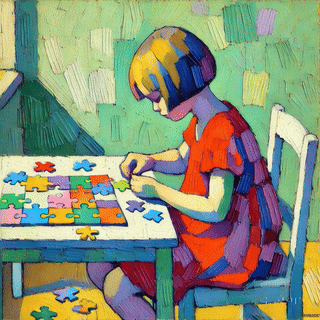What Drives the Human Fascination with Creating and Solving Puzzles?
What Drives the Human Fascination with Creating and Solving Puzzles?

Unlocking minds: Why we love to challenge ourselves—and others—with puzzles

Humans are hardwired to seek patterns, solve problems, and impose order on chaos—puzzles give us all three. Whether it’s a jigsaw, crossword, logic game, or even a mystery novel, puzzles reflect our curiosity and desire to master uncertainty. In this post, we’ll explore the psychology behind our love of puzzles, how they stimulate our brains, and why both creation and solution offer deep satisfaction. If you’ve ever wondered why solving Wordle feels so good—or why designing an escape room is so satisfying—read on.
A Quick Puzzle—and a Clue About Ourselves
Imagine you’re handed a riddle:
“I speak without a mouth and hear without ears. I have no body, but I come alive with wind. What am I?”
Even before you attempt the answer (it’s “an echo”), your brain starts scanning for connections. This instant engagement is no accident—puzzles spark a primitive part of us that evolved to find patterns in nature: predator tracks, weather signs, ripening fruit. Long before leisure existed, puzzles were survival training.
The Cognitive Candy of Problem Solving
Solving puzzles activates multiple areas of the brain—especially those involved in memory, spatial reasoning, and logical sequencing. This kind of engagement triggers a dopamine release, giving us a hit of pleasure when we make progress or reach a solution. In short, puzzles reward us chemically for cognitive effort.
This makes puzzles similar to physical workouts for the brain. Just like athletes train to improve strength or endurance, puzzlers “train” to improve memory, logic, or creativity. The challenge-satisfaction loop keeps us coming back, puzzle after puzzle.
The Joy of the Creator
On the flip side, crafting a puzzle taps into our love for storytelling, game design, and strategic thinking. Creating a good puzzle is like composing a symphony or writing a novel—it requires pacing, complexity, and an understanding of your audience.
Puzzle creators get joy not only from solving challenges themselves but from engineering “aha!” moments for others. It’s a form of intellectual playfulness that blurs the line between art and logic.
Real-World Puzzle: The Rubik’s Cube Phenomenon
Take the Rubik’s Cube. Since its invention in 1974, it has sold over 450 million units. Why? It combines simplicity with staggering complexity. Each twist is easy, but solving it requires strategy, memory, and pattern recognition. It’s a puzzle that evolves with the solver—novices marvel at a single solved side, while experts race to solve the whole cube in seconds.
This global obsession illustrates how puzzles can become a personal journey of mastery, appealing across cultures and generations.
Puzzle Culture and Social Play
Puzzles aren’t always solitary. Escape rooms, ARGs (Alternate Reality Games), and co-op puzzle games tap into the social side of our problem-solving instincts. Working together to crack codes or find clues mimics early human survival dynamics—collaboration, communication, and collective reasoning.
From ancient labyrinths to online puzzle forums, the communal aspect of puzzles fuels both connection and competition.
Summary: Our Minds Were Built for This
We puzzle because it satisfies a deep-rooted need to explore, understand, and control our environment—one pattern at a time. Whether you’re solving or creating, puzzles offer a playground for the mind.

 Bookmarked for You
Bookmarked for You
If today’s question struck a chord, these books dive deeper into the nature of puzzles and the minds that love them:
The Puzzle Instinct by Marcel Danesi – A cultural history of puzzles and what they reveal about human cognition
Gödel, Escher, Bach by Douglas Hofstadter – A cerebral dive into how patterns and puzzles connect art, logic, and mathematics
Moonwalking with Einstein by Joshua Foer – A journalist’s journey into the world of memory championships and mental athletics
 QuestionStrings to Practice
QuestionStrings to Practice
In a world where the right question often matters more than the answer, here’s a powerful type of QuestionString to sharpen your inquiry:

For digging into why something draws you in:
“What makes this interesting to me?” →
“What’s the pattern I’m trying to find?” →
“How would someone else approach this differently?”
Try using this string when you feel intellectually curious—it can reveal more than just the answer.



Comments
Post a Comment